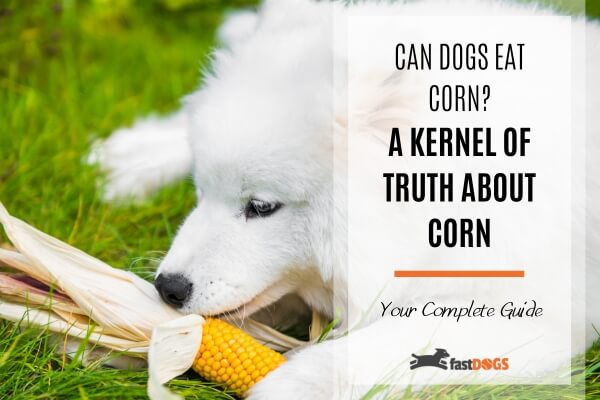What Fruits Can Dogs Eat? The Good the Bad & the Ugly—Fruits

What Fruits Can Dogs Eat? And What to Avoid
They say, ‘an apple a day keeps the doctor away,’, but can it also keep the vet away? Is it even safe to feed your pooch fruit, and if so, what fruits can dogs eat?
Fortunately, the answer is yes! Most fruits are perfectly okay for you to treat your furry best friend with. And, like us humans, the nutrients found in fruit can benefit your pup’s health too.
That said, some fruits can be harmful to dogs, while others should only be served in moderation. Hence, it’s handy to know which fruits to steer clear of and which you can share.
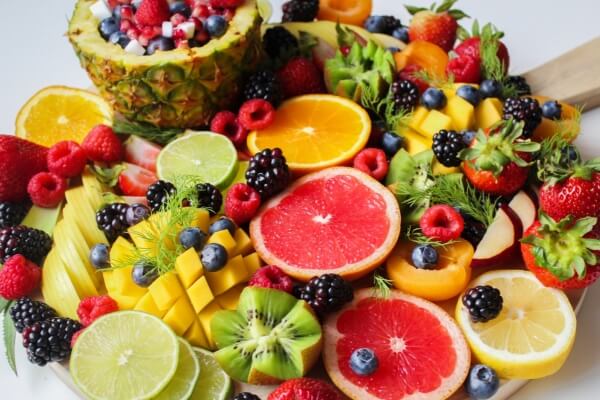
The Benefits of Fruit for Dogs
Just like us, dogs are omnivores who can digest both meat and plant-based foods. Many commercially available dog foods contain fruit or vegetable extracts to boost their nutritional value. If your pooch is following a well-balanced meal plan, they technically have no need for any extra fruit in their diet.
However, fruit can be a tasty treat as an alternative to the calorific dog treats you may have fed your pup in the past. As an added advantage, the best fruits for dogs can offer several health benefits:
Vitamins and minerals in fruit can contribute to your dog’s overall health and boost their immunity.
Fruits contain antioxidants, which help combat the free radicals in a dog’s body — reducing the risk of chronic diseases and promoting healthy aging.
With a high water and fiber content, fruit boosts hydration, aids digestion, and promotes proper bowel movements.
What Kinds of Fruits Can Dogs Eat?

Although the following list of fruits are considered safe for dogs and even fruits puppies can eat, that doesn’t automatically make them good for your pet. Many fruits are high in natural sugars and fiber. This means they should only be served in moderation to avoid gastric upset for your pooch.
Fruits safe for dogs include:Apples
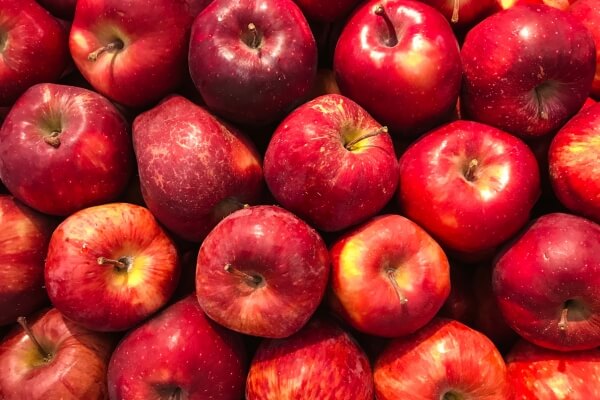
All types of apples are safe for your dog to eat and high in essential vitamins, including A and C, as well as being a solid source of dietary fiber. Apples are also an ideal treat for senior dogs as they contain less fat than many other pre-made dog snacks.
You should always wash, core, deseed, and slice the apples into small chunks to avoid choking hazards. Note — the seeds of apples contain trace levels of cyanide, which is toxic to your pooch (and us humans too, but the quantity is so low we don’t need to worry about it as much as our canine friends!).
Bananas
Fiber and potassium-rich, plus a generous source of vitamins, bananas make a tasty treat for your dog but only in moderation due to the high levels of sugar they contain.
You should always peel a banana before giving them to your pup as the skin can be difficult for their stomachs to digest. Chopping the banana into bite-sized pieces can avoid any other intestinal blockage issues.
Check out our complete guide to Can Dogs Eat Bananas?Blueberries
Probably one of the most nutritious fruits you can offer your dog — blueberries even have superfood status. These tiny berries contain stacks of antioxidants that combat free radical cells in your pooch’s system — preventing/reducing cell damage.
Combine that with the high level of dietary fibers and other fruity phytochemicals, and you have a handy bite-sized healthy snack for your pup.
Blueberries can be served fresh or frozen, although be careful with excitable smaller dogs who can choke on the tiny berries.
Learn more, check out our guide on Can Dogs Eat Blueberries?Cantaloupe
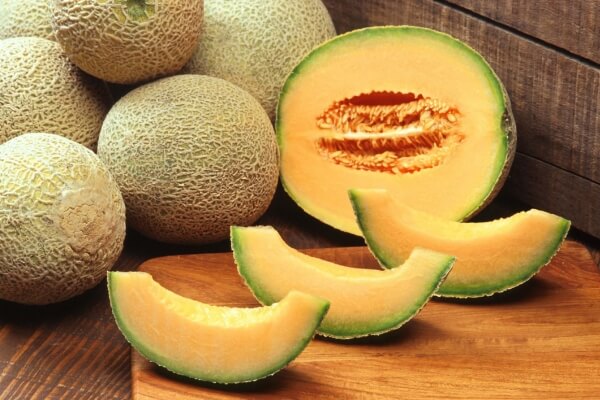
Cantaloupe melon is another fruit that’s okay to give to your pup, packed with nutrients, low-calorie, and an ideal source of hydration for dogs. However, this fruit is high in sugar, which means it should be offered sparingly if your dog is overweight or suffers from diabetes.
Why not try freezing small pieces as a refreshing and cooling summer treat for your pooch?
Cranberries
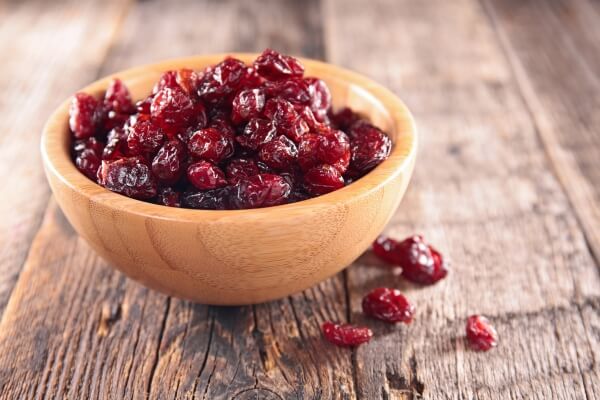
Another dog-safe berry, although whether they will like the tart flavor of cranberries is another matter. You can feed your pup both fresh and dried forms of this fruit in small quantities. But, be aware that many store-bought dried cranberries are often sweetened, which adds unwanted extra sugars to your pup’s diet.
Although cranberries can be beneficial for urinary tract infections, bear in mind that their tart acidic taste may lead to an upset stomach if your pup consumes too many. And, cranberry sauce or jelly is an absolute no-go!
Mango
A tropical fruit that gets the thumbs up, mango is another sweet fruit your pooch can enjoy. However, ensure they don’t get their jaws around the large pit stone in the middle of the fruit — not only is it a severe choking hazard but also contains cyanide, which is toxic to canines.
The skin of a mango may not be poisonous to dogs, but it’s tough and fibrous, hence, tough to digest. What’s more, they may even choke on it if eaten too quickly. Always remove the skin and pit before offering mango to your beloved dog.
Read more about this fruit in our guide on Can Dogs Eat Mango?
Oranges
Most vets will agree that oranges can be a healthy choice for your dog. Yet, trying to get your canine to concur may take some persuasion. Dogs are often put off by any powerful citrus odors or flavors.
However, with high levels of vitamin C, and minerals like potassium, plus the fact they’re a high-fiber fruit — oranges can promote your dog’s immune health, digestive system, and heart and muscle health.
Bear in mind that the skin can be tricky for your pooch to digest and should always be removed. And, oils found in the peel or the pith can turn many dogs' noses away.
Pears
Containing the essential mineral copper, plus plenty of vitamins — including K and C — and loaded with fiber, pears are fruits dogs can eat. You can even find store-bought dog-friendly pear-based snacks paired with proteins such as duck or salmon.
But, you must remove the cyanide-containing core and seeds/pips as you chop it into bite-sized chunks. And, like peaches, avoid offering any kind of pears in cans.
Pineapple
There’s plenty for your pooch to love about this tropical fruit — from the refreshing taste to the wide spectrum of vitamins and minerals pineapple manages to pack in. Bromelain in particular, is only found in this fruit, an enzyme that can aid in reducing inflammation and improve protein absorption in canines.
You wouldn’t eat the skin or the hard core of the pineapple yourself, hence, they should both also be removed before serving to your pup. This is to avoid any choking hazards or intestinal blockages. The high sugar content of the pineapple also means you should limit just how much your dog enjoys.
Want to know more? Read our guide on Can Dogs Eat Pineapple?Raspberries
Chock full of antioxidants, raspberries are a natural anti-inflammatory that’s beneficial for older dogs with aging joints.
Although they’re low in sugar and calories, they do contain a teeny weeny amount of xylitol, which is toxic to dogs. This sweetener is naturally occurring in raspberries, yet the levels are way below the danger levels — your pooch would have to consume quite a few raspberries in one sitting to cause an issue.
However, it’s best to err on the side of caution — avoid feeding your pup any more than a small handful or eight ounces of raspberries per serving.
Strawberries
Strawberries, in addition to being a great source of fiber, include vitamins like A and C and a bonus enzyme to boost your pup’s dental health — leaving them with a whiter smile. As with all fruits, they contain natural sugars and should only be served in moderation.
Always wash and remove the stem of the strawberry before serving and slice it into small pieces to avoid your pooch choking.
Watermelon
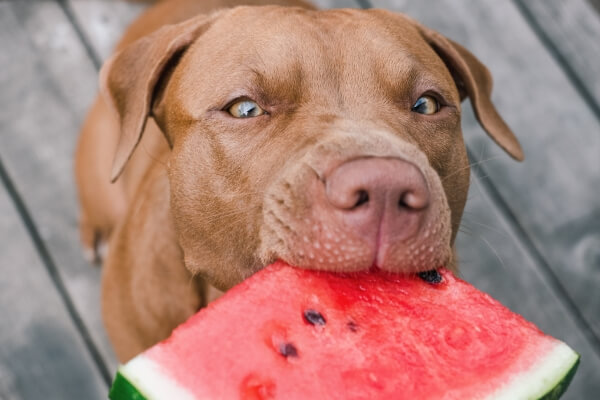
A rich source of vitamins C, A, B6, and potassium, watermelon is one of the healthiest fruits for its antioxidant properties.
But stick to the fleshy part — the rind and seeds can often cause intestinal blockages for your dog, especially smaller pups, and should always be removed beforehand. Plus, being made up of 92 percent water, this fruit can be an ideal hydrating treat in those hot summer months.
What Fruits Can Dogs Not Eat?
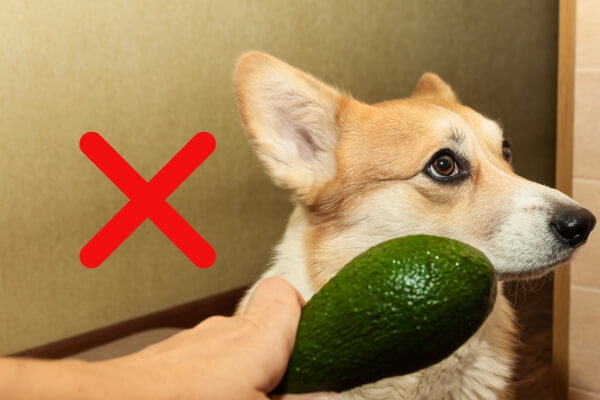
Unfortunately, it’s not all good news, and there are some fruits you should avoid giving to your four-legged friend. A dog’s digestive system works very differently from a human’s, and what can be considered safe for us to eat may be toxic to your pup.
Avocado
Whether it’s a spicy guacamole or on toast, many of us love avocados, but they should never be shared with your pooch. The skin and the pit of an avocado contain persin, a toxin that’s known to cause vomiting and diarrhea in dogs.
Avocado flesh may not have as much persin as the rest of the plant, but it’s very high in fat. This can lead to stomach upset for your pup and even contribute to serious conditions like pancreatitis if too much is consumed.
Cherries
Cherry pits contain cyanide, which may not be harmful if swallowed by a human, but if a dog chews the stone it will release the toxin and cause havoc on your dog’s health. Cyanide disrupts cellular oxygen transport in your canine — meaning the dog’s blood cells won’t get enough oxygen.
If you have a cherry tree in your yard, ensure your pup can’t get to any fallen fruit. Eating whole cherries will often cause breathing difficulties for your pooch, and you should seek veterinary attention immediately.
Grapes

The most toxic fruit for dogs is the humble grape. It’s not dose dependent, in that, just one grape can lead to toxicity. What’s more, nobody is quite sure why grapes are so harmful to dogs. Yet, regardless of the dog's breed, sex or age, consuming this fruit can lead to acute kidney failure.
Remember, raisins, sultanas, and currants are all dried forms of grape, and are also highly toxic to your dog. If you’re throwing away grapes or raisins, place them in a dog-safe trash can, and don’t add them to a compost bin unless you’re confident your curious canine cannot access the contents.
Passionfruit
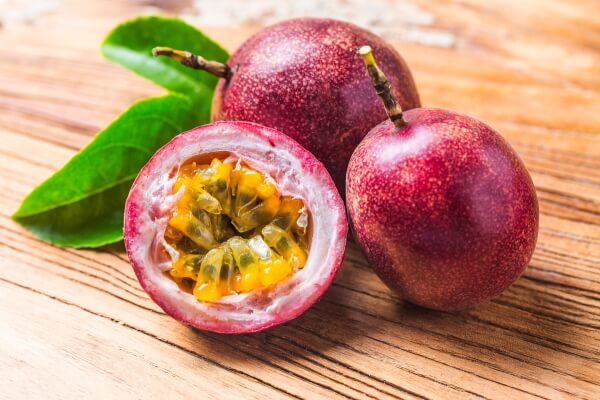
Dogs can’t eat passion fruit as it’s super sweet and high in sugars. Plus, the seeds, rind, and skin contain cyanide that’s poisonous to canines. Although the fruit does contain some nutrients that may be beneficial to your dog’s health — for example, to help lower blood pressure. Yet, the risks far outweigh them — basically don’t do it!
Final Thoughts
Although dogs don’t need to eat fruit as part of their balanced diet, some fruits can be a healthy treat — offering a nutritional boost.
But, before you start serving fruits to your pup, check what fruits can dogs eat and those that should be avoided. While there are plenty for your pup to choose from, some can be highly toxic. What’s more, introduce them gradually, keep an eye on any possible reactions, and if in doubt consult with your vet.
Can Dogs Have Fruit? FAQs
How Much Fruit Should You Feed Your Dog?
The amount of fruit you should feed your dog depends on factors, such as their size, age, activity level, and overall health. Fruits should only constitute a small portion of your dog's diet, typically no more than 10 percent of their daily calorie intake.
Are There Any Fruits Puppies Can Eat?
Tiny bites of puppy-friendly fruits like blueberries, mangoes, bananas, strawberries, apples, and watermelon offer delectable and nutritious snacks for little pups. Remember, treats should equate to less than 5 percent of your puppy's diet, so share them sparingly and occasionally.
Can Dogs Eat Canned Fruits?
Although fresh fruit, or even frozen fruit, can be safe for your dog, you should avoid pre-packaged fruits from a can or a jar. Normally the fruit will be preserved in a very sugary syrup, which can be harmful to your dog’s health or even worse, may contain artificial sweeteners such as xylitol, which is toxic to canines.
What Are the Best Fruits for Dogs?
Fruits good for dogs are high in antioxidants, like blueberries or watermelon. But they can still be high in sugars and should only be served in moderation.
How Can I Introduce Fruit Into My Dog’s Diet?
Start with small portions and observe your dog's reaction. Introduce one type of fruit at a time to monitor for allergic reactions or digestive issues. Gradually increase the amount over several days if there are no adverse effects.
Can Dogs Eat Tomatoes?
Just as there are arguments about whether a tomato is a fruit or a vegetable there is also much debate about whether a dog can eat tomatoes or not. The red fleshy part of the tomato “fruit” itself is safe for dogs to eat. Yet, the green parts of the plant — leaves, stems or unripe tomatoes — contain solanine that’s poisonous to dogs.
For a more detailed answer, check out our guide on Can Dogs Eat Tomatoes?
Can Dogs Eat Rhubarb?
While many of us assume rhubarb is a fruit, it’s actually classed as a veggie. But regardless of its status, it’s still not safe to give to your pooch.
Rhubarb leaves are rich in oxalic acid, which is toxic to dogs if it’s ingested in larger amounts. Although the stalk contains less acid, it’s still best to avoid it. The extremely bitter taste may upset your dog’s stomach while the fibrous nature of rhubarb can cause intestinal blockages.
What Vegetables Can Dogs Eat?
Many of the same vitamins, minerals, and antioxidants that are beneficial for your pup can also be found in vegetables. Plus, natural sugars should be a lot lower.
Vegetables safe for your dog to eat include:
Brussels sprouts.
Celery.
Green beans.
Carrots.
Cabbage.
Peas.
Potatoes and sweet potatoes.
Pumpkin.
Spinach.
Just like fruit, some vegetables can be toxic for your canine companion — these include:
Garlic.
Chives.
Leeks.
Rhubarb.
Wild mushrooms.

